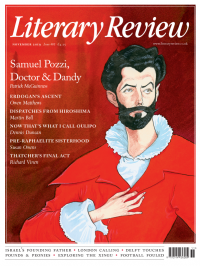Ian Critchley
Nan about Town
Grandmothers
By Salley Vickers
Viking 296pp £16.99
The protagonists in Salley Vickers’s novels tend to be either artists or in some way transformed by works of art. Her debut, Miss Garnet’s Angel (2000), centres on a series of paintings featuring the Archangel Raphael that Miss Garnet stumbles across in a Venetian church. In Vickers’s 2018 novel The Librarian, the main character is a champion of children’s literature. The Cleaner of Chartres (2012) sets cleaning – one of the most everyday tasks – against a backdrop of breathtaking architecture. Art in her novels fulfils several functions: it is therapeutic, an escape, a window onto other ways of being and a means of understanding both oneself and the wider world.
All three women at the heart of Vickers’s new novel are arty in their own way. Nan Appleby is a published poet, writing under the pseudonym A G Nunne, ‘an admired if obsessively reclusive poet’. Minna Dyer is determined to read Proust, having already worked her way through the great Russian writers (‘She was no judge, but Tolstoy she reckoned could do with some editing’). Meanwhile, the well-off Blanche Carrington decides to take a trip to Paris, where she becomes transfixed by da Vinci’s painting in the Louvre of St Anne with her daughter Mary and her grandson Jesus.
St Anne, the patron saint of grandmothers, is an appropriate symbol for this novel, which explores several relationships between grandparents and grandchildren. Nan regularly looks after her young grandson Billy, while Blanche has been banned by her son from seeing her grandchildren, Kitty and Harry, after driving them while

Sign Up to our newsletter
Receive free articles, highlights from the archive, news, details of prizes, and much more.@Lit_Review
Follow Literary Review on Twitter
Twitter Feed
Though Jean-Michel Basquiat was a sensation in his lifetime, it was thirty years after his death that one of his pieces fetched a record price of $110.5 million.
Stephen Smith explores the artist's starry afterlife.
Stephen Smith - Paint Fast, Die Young
Stephen Smith: Paint Fast, Die Young - Jean-Michel Basquiat: The Making of an Icon by Doug Woodham
literaryreview.co.uk
15th-century news transmission was a slow business, reliant on horses and ships. As the centuries passed, though, mass newspapers and faster transport sped things up.
John Adamson examines how this evolution changed Europe.
John Adamson - Hold the Front Page
John Adamson: Hold the Front Page - The Great Exchange: Making the News in Early Modern Europe by Joad Raymond Wren
literaryreview.co.uk
"Every page of "Killing the Dead" bursts with fresh insights and deliciously gory details. And, like all the best vampires, it’ll come back to haunt you long after you think you’re done."
✍️My review of John Blair's new book for @Lit_Review
Alexander Lee - Dead Men Walking
Alexander Lee: Dead Men Walking - Killing the Dead: Vampire Epidemics from Mesopotamia to the New World by John Blair
literaryreview.co.uk